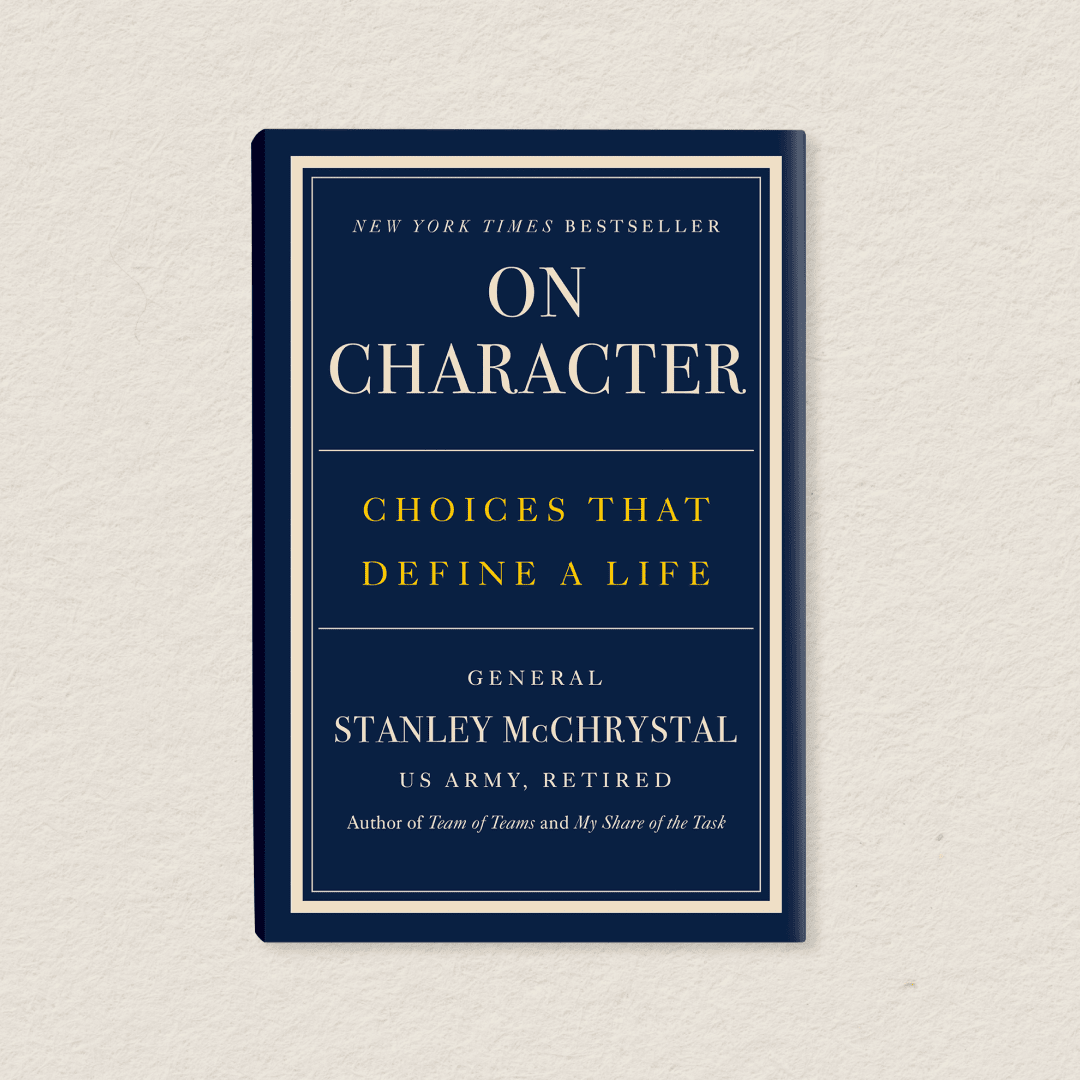In this candid and deeply reflective conversation with Owen Daugherty, General Stan McChrystal shares the story behind his latest book, On Character: Choices That Define a Life.
Drawing from personal experience, military leadership, and decades of introspection, McChrystal explores why character—not credentials, strategy, or charisma—is the foundation of lasting leadership.
Highlights from the discussion include:
- The Origin of the Book: Born from nightly reflections shared with his wife, On Character evolved into a powerful meditation on conviction, discipline, and legacy.
- A Working Definition: McChrystal defines character as the product of deeply held convictions and the discipline to live them every day.
- Leadership Lessons: From one-meal-a-day habits to battlefield decisions, McChrystal emphasizes self-awareness, consistency, and the courage to be authentic.
- Organizational Culture: Character shows up in who we reward, how we act, and whether we live our values—even when no one’s watching.
- A Call to Action: Building a culture of character starts with small groups, everyday choices, and the humility to hold ourselves and each other accountable. Watch the full webinar and download the On Character Book Club Discussion Guide to spark meaningful dialogue in your team, classroom, or community.
Watch the full webinar and download the On Character Book Club Discussion Guide to spark meaningful dialogue in your team, classroom, or community.
In a recent webinar, General Stanley McChrystal delved into the themes of his latest book, On Character: Choices That Define a Life. He emphasized the profound impact of character on leadership and organizational culture.
The Genesis of On Character
“How is the book sitting with you now, a couple weeks after launch?”
McChrystal explained that On Character began as informal reflections he would share with his wife Annie during quiet evenings. At Annie’s encouragement—“write it down”—those reflections grew into 800–1000 word essays on topics like aging, leadership, and mortality. The original title was What I Think About the Things I Think About, but the unifying theme quickly emerged: character.
“We realized everything I was writing came back to questions of character. That’s what I was really thinking about.”
Writing as Reflection
“You live a busy life—how did you find time to write this, and how can others carve out space for reflection?”
McChrystal stressed that writing helped him refine and challenge his thinking.
“Your thinking is different than you thought your thinking was.”
He encouraged others to reflect in “pieces”—choose a single idea, sit with it, write or talk about it. You don’t need to write a book; the point is to engage more deeply with the ideas that matter to you.
Defining Character
“You’ve said this book isn’t prescriptive—but you do offer a working definition of character. What is it?”
McChrystal defines character as:
Character = Convictions x Personal Discipline
- Convictions: Deep, pressure-tested beliefs—not assumptions or inherited values, but those earned through reflection and experience.
- Discipline: The consistent ability to act in accordance with those convictions.
Without discipline, convictions don’t hold. And without honest reflection, convictions may not be real.
At the heart of McChrystal's message is the belief that character is the sum of one's convictions and the discipline to uphold them. He posits that while convictions are tested over time, discipline is a daily choice, forming the backbone of consistent character.
Practical Discipline: The One-Meal-a-Day Habit
“People admire your discipline—especially the one-meal-a-day habit. Where does that come from?”
McChrystal revealed that his famed discipline comes from knowing his own limits.
“I’m not disciplined enough to eat small meals, so I don’t eat at all until dinner.”
For over 40 years, he’s used this habit not to project control, but to manage a personal weakness. Similarly, daily exercise is less about fitness than emotional regulation. His example underscores the importance of knowing yourself—and designing your habits around that knowledge.
Illustrating personal discipline, McChrystal mentioned his practice of eating one meal a day for over 40 years. Recognizing his own tendencies, he found this routine helped maintain control and focus, underscoring the importance of self-awareness in cultivating discipline.
Consistency and Adaptability in Leadership
“As leaders, how do we balance the desire for consistency with the need to be contextual and adaptive?”
McChrystal emphasized that leadership must be grounded in values but flexible in action.
“You talk to soldiers differently on Monday than you do on Friday.”
He warned against “lists” of what leaders should do and instead urged self-awareness, consistency with values, and transparency with teams—even about flaws.
“People will forgive you for not being the leader you should be. But they won’t forgive you for not being the leader you claim to be.”
McChrystal highlighted the necessity for leaders to be consistent in character while adaptable in approach. He stressed that authenticity, including acknowledging one's flaws, fosters trust within teams. Leaders should strive to be the individuals they aspire to be, even if perfection is unattainable.
Organizational Character and Culture
“You’ve talked about rewarding character in others. Can you share an example?”
McChrystal told the story of a successful 2006 operation to eliminate Abu Musab al-Zarqawi in Iraq. Hundreds participated, but only one medal was awarded: to a quiet intelligence sergeant who showed restraint and patience for weeks.
“Organizational character is reflected in who we reward, who we value, and how we talk about them.”
Drawing from his military experience, McChrystal recounted a 2006 operation in Iraq where the collective effort led to significant intelligence gains. He emphasized that organizations reveal their character through whom they celebrate and the values they uphold. Recognizing team achievements over individual accolades reinforces a culture of collective success.
The Erosion of Character in Modern Society
“What have you seen leaders or organizations do—sometimes unintentionally—that erodes character?”
Two main threats:
- Exclusive leadership behavior: When leaders create inner circles (e.g., faith groups, social cliques), they unintentionally marginalize others.
- Say-do gap: When stated values don’t align with actions, cynicism spreads.
“We’ve all seen the poster that says ‘Integrity’ while knowing that’s not what’s happening in the room.”
Addressing contemporary challenges, McChrystal observed a societal trend where character is often undervalued. He warned that when society rewards success devoid of integrity, it undermines the foundational importance of character. He advocates for a collective recommitment to character as a societal cornerstone.
Cultivating Character in Future Generations
“So what do we do about it? How do we make character more central in the spaces we lead?”
McChrystal believes:
- It should begin with young people, not institutional systems.
- Small groups can define their own norms—just like Washington’s list of a gentleman’s rules.
- Peer accountability is powerful, even informal: “If your friend’s having a weak moment, you just say, ‘I thought we weren’t doing that.’”
McChrystal believes that instilling character should begin with youth. He encourages the formation of small groups committed to shared values, promoting respect, fairness, and integrity. By modeling these behaviors, individuals can influence peers, mentees, and communities, fostering a ripple effect of character development.
McChrystal's Ongoing Initiatives
“What are you personally doing to take this message forward beyond the book?”
Currently, McChrystal is actively promoting discussions on character through various platforms:
- More Perfect: An initiative aimed at fostering national reflection on character.
- Yale Lecture Series: Engaging with students on leadership and character.
- Public Speaking: Participating in events to bring character to the forefront of organizational conversations.
- Book Clubs: Encouraging group discussions around On Character to deepen understanding and application of its principles.




